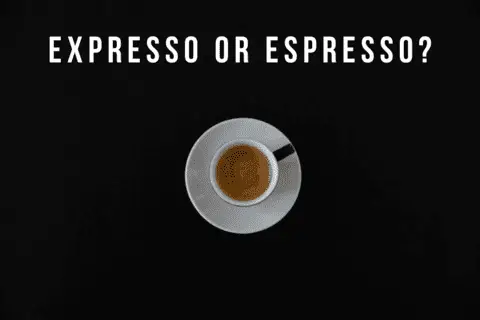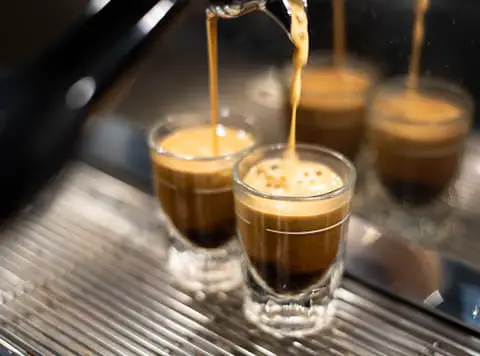As an Amazon Associate I earn from qualifying purchases. When you use our links, we may earn an affiliate commission. Learn more.
I have friends who always ask a barista for an expresso, which irritates me because the correct pronunciation is espresso.
Or is it?
After performing detailed research, speaking with experts, and consulting historical language records and numerous dictionary definitions, I discovered that whether you should use espresso or expresso depends on which country you reside in.
In short, espresso is the more commonly used noun, and you can correctly use it in every country except France, where it’s an Expresso.
Which is correct expresso or espresso?

Expresso and espresso are both correct. The two words have the same meaning, and their proper use depends on which country you reside in or are visiting:
- English speaking countries use espresso and expresso, although espresso is more commonly used
- France uses expresso, and it is written as such in the French dictionary
- Italy uses espresso
- Other countries use espresso
Although expresso or espresso are correct words to use in America today, expresso was initially regarded by usage experts as a misspelling because it deviated from the original Italian word.
Language experts subsequently debated this, and both are now considered acceptable, although espresso is the more commonly used word in English-speaking countries throughout the world.
Which Pronunciation to Use?
In the majority of cases, you should use the espresso pronunciation. Espresso is a noun that refers to a strong type of coffee.
If you speak English or Italian, you should always use the espresso pronunciation.
The only commonly accepted deviation from this guidance would be when pronouncing, or writing, in the French language, which you should pronounce as expresso.
This free cheat sheet will improve your coffee brew by providing quick information on brew ratio, grind size, optimal brewing time, and more.
Espresso Definition
Espresso is from the Italian caffè espresso meaning “pressed coffee” where strong coffee is made by forcing steam or boiling water through finely-ground, medium, or dark roast coffee beans.

The word espresso is relatively new for the English language.
The first recorded usage dates back to 1940. The confusion about pronunciation and spelling may originate from when espresso began spreading widely in English.
The word “espresso” is derived from the Italian verb “esprimere,” which is a derivation of the Latin verb “exprimere.”
So, arguably, “expresso” is more accurate because it’s closer to the words Latin origin.
Expresso Definition
Expresso is a spelling variation of espresso. Expresso is coffee made by forcing steam through finely-ground coffee. The ideal expresso extraction time is twenty to thirty seconds which is relatively fast and close in meaning to the English word “express,” which Merriam-Webster defines as “to force out by pressure.”

Thus, it’s not unusual or wrong that this coffee drink is called expresso.
People Also Ask
Why do the French say expresso?

The French say expresso because that is how the word espresso is written in the French language. Expresso and espresso have the same meaning, and both refer to a coffee made quickly by forcing boiling water through the coffee beans under pressure.
What is the difference between espresso and expresso?

Espresso and expresso mean the same thing. Expresso is a spelling variation of espresso, which derives from the Italian verb “esprimere.”
Do Italians say espresso or expresso?

Italians say espresso, or sometimes caffè espresso meaning “pressed coffee.” Italians may also say caffè as an abbreviated version of the word, and it is pretty commonly referred to as such when placing a coffee beverage order with a barista.
Is it wrong to say expresso?

Unless you are in France, it’s correct to say expresso. Usage experts and Historians continue to debate the accuracy and validity of the word expresso and whether it entered the dictionary by error or due to its proximity to the Latin verb “exprimere” from which the Italian version of the word, espresso, was derived.
Verdict
Having researched the dictionary definitions, Latin origins, and differences between the words espresso and expresso, I now have a much greater appreciation for the eternal debate on which one is correct and when to apply it.
The five key points in the Expresso vs. Espresso conclusion are as follows:
- In most situations, the correct word to use is espresso.
- Expresso can also be used in English-speaking countries, although experts would argue that it entered the dictionary by mistake.
- Only use espresso in Italy or Italian cafes, or it will expose you as a fraud who does not understand authentic Italian caffè culture.
- France uses expresso, also written as expresso in the French dictionary.
- Although rare in British and American English, expresso appears more often in American English. The Oxford dictionary does not list expresso as an acceptable alternative word, whereas the Collins and Merriam-Webster dictionaries do.
If you would like to learn more about the intricacies of the expresso vs. expresso debate, please watch this video and study the cited references listed below.
References
- https://www.merriam-webster.com/dictionary/express
- https://www.merriam-webster.com/words-at-play/espresso-vs-expresso-usage-history
- https://www.oxfordlearnersdictionaries.com/definition/english/espresso
- https://www.collinsdictionary.com/dictionary/english/expresso
- https://en.wikipedia.org/wiki/Expresso
Brooke Davis
Hi everyone, my name is Brooke and I’m a Barista and freelance writer. I love brewing coffee and my favorite coffee drink is without doubt an Americano (espresso with added hot water). When I’m not busy making or writing about coffee you’ll find me hanging out at the beach with friends in California where I am currently residing. Follow me on: LinkedinThis free cheat sheet will improve your coffee brew by providing quick information on brew ratio, grind size, optimal brewing time, and more.


